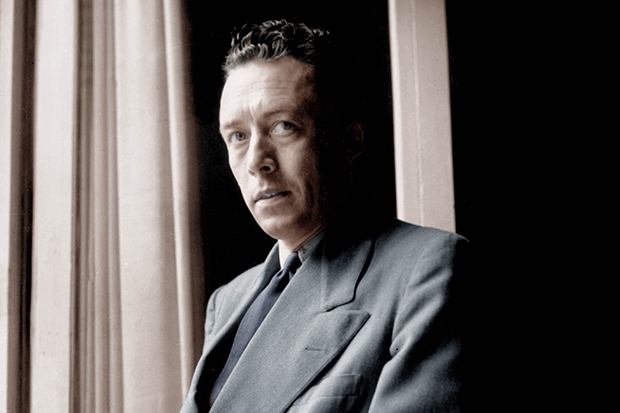Looking for the Outsider is the biography of a novel, from conception through publication to critical reception. Alice Kaplan’s life-story of L’Étranger (The Outsider in English translations, The Stranger in American) is a lovely work, lucid and thought-provoking. It makes one feel afresh the sheer strangeness of Albert Camus’s imagination.
All genius is, perhaps, freakish; but Camus’s sprang from peculiarly unpromising soil. He was born in a white working-class area of Algiers. His father was killed in the battle of the Marne before he was one. His mother was deaf and illiterate, with a vocabulary of about 400 words; she worked as a cleaner. His uncle was also deaf and nearly mute, and made barrels. They were impoverished even by the low standards of the other petits colons.
In this silent household, ‘whose limited language favoured a world of objects rather than abstractions’, Camus was an anomaly. School gave him his chance. He was spotted at primary school, and sent on to secondary lycée, into ‘a totally unfamiliar environment’, where he met his first mentor, Jean Grenier. But at 17, he began to cough blood, and was diagnosed with tuberculosis.
Camus, the working-class colonial, was a lifelong outsider to mainstream French culture, even though he rapidly penetrated to the centre of the fashionable literary scene. What critics did not like in him, he once remarked, was ‘the Algerian’ (‘Ce qu’ils n’amiaient pas en lui, c’était l’Algérien’). Transplanted to Paris, he missed above all the sun and the sea — overwhelming forces in L’Étranger.
Kaplan’s history charts the success of Camus’s debut novel, which is an astonishing tale. It was published in the most unpropitious circumstances, during the Nazi Occupation. His wily publisher, Gallimard, flitted round the country scavenging for paper. Publishers were supposed to ‘Aryanise’:
Gallimard operated — just — within this system (he sacked his Jewish business manager, but continued to pay him in secret), and was compromised in postwar eyes.
After the war’s end, Camus’s reputation took off. Kaplan is particularly brilliant at showing the ways in which the novel was refracted in reading. L’Étranger has been called a ‘colonial allegory, an existential prayer book, an indictment of conventional morality, a study in alienation, or a Hemingway rewrite of Kafka’.
Camus’s portrait of a man apparently without empathy is a tour de force. He tells the story of Meursault, who buries his mother without a tear, writes a letter to help a pimp beat up his Arab mistress, and shoots an Arab on the beach, all related in a flat, toneless, first-person narrative. The first person, as an early critic noted, ‘is usually used for confessions and interior monologue, interminable descriptions from the inside’, but ‘is used by M. Camus to keep away from any analysis of the state of the soul’.
‘How can such a distant and empty narrator capture so much attention, and how can such a disturbing book elicit so much sympathy?’ Kaplan asks; and suggests that ‘the absence of depth in Meursault, his strange indifference, has paradoxically drawn readers to him, since it is natural to hunger for understanding when it is withheld.’
All readers, as the revisionist novelist Kamel Daoud remarked, have a ‘lecture fantasmée’ of L’Étranger (his own, The Meursault Investigation, rewrote the novel from the point of view of the brother of the nameless murdered Arab). Most of us first read L’Étranger as a teenager, at an age when sullen indifference is natural, whether rebellious or miserable. My interpretation as a 15-year-old was depressive: I read Meursault as the embodiment of accidie. Re-reading the novel as an adult, I was struck by how close Meursault seems to a high-functioning autist. Those sentences like discrete islands suggest an autistic lack of ‘central coherence’; his literal-mindedness; his hyper-sensitivity to light and sound; his indifference to social codes and norms; and his inability to see the point of game-playing or lies are all suggestive. (I recently sat next to an autistic teenager at dinner, a handsome and charismatic young man, who was trying to get to grips with the social lie. He told me that one must not tell girls they are ugly, because it is ‘unkind’; but he had found a ‘brilliant’ way to tell them ‘without being unkind’: ‘One can say, “If you looked in a mirror, it would crack.” ’)
In his lifetime, Camus was feted as an existentialist: a label he repudiated, but in vain. To young Americans, ‘Camus’s trenchcoat was existentialist; his cigarettes were existentialist.’ The backlash, inevitably, came in the 1970s, when Camus was labelled sexist, racist and colonialist. According to Edward Said: ‘The Arabs of The Stranger are nameless beings, used as background for the portentous metaphysics explored by Camus.’
Movingly, Kaplan tracks down the ‘nameless’ Arab from the interracial quarrel on the beach that originally sparked Camus’s imagination. He has a name, at last; and a life-story that turns out to have poignant echoes of Camus’s own.
Camus, of course, is not Meursault. As he wrote to one critic, the novel is not realistic, but a ‘photographic negative’. Kaplan makes a good case for saying that Meursault is the inverse side of his creator’s humanism. Camus was himself, after all, a loving son, an extraordinarily energetic and ambitious writer, and as a young journalist wrote tellingly against colonial violence and injustice — though from the standpoint of reform, not of the revolution (which was still to come). Camus, ironically, is routinely denounced by the revolutionary brigade for this remark: ‘At this moment bombs are being planted in the trams in Algiers. My mother could be on one of those trams. If that is justice, I prefer my mother.’ Meursault was condemned for loving his mother too little; Camus for loving his too much.






Comments